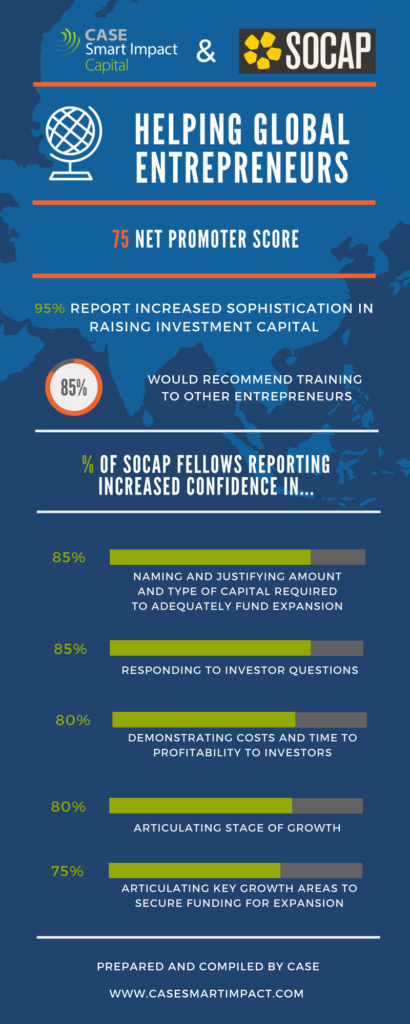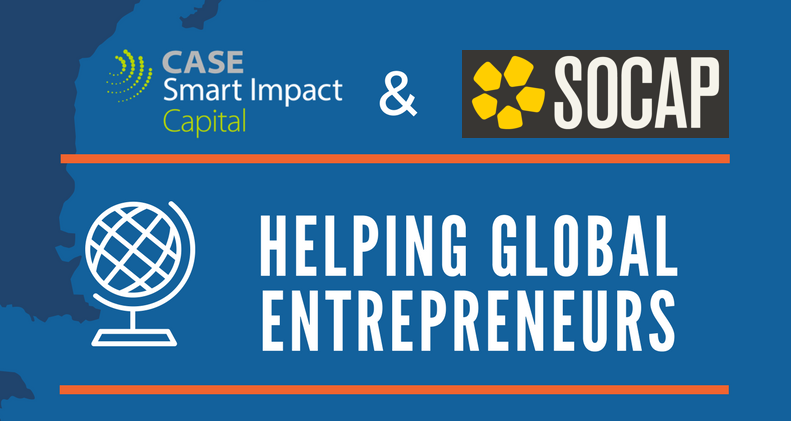A SOCAP Guest Post By Jason H. Parker
Based at the Fuqua School of Business at Duke University, The Center for the Advancement of Social Entrepreneurship (CASE) is a leading research and education center for social entrepreneurship. The program’s mission is to promote the entrepreneurial pursuit of social impact through the thoughtful adaptation of business expertise, and to help leaders leap the chasm between a good idea and sustainable impact at scale. CASE is a SOCAP Network partner.
81% of SOCAP Fellows Using Online Tools to Improve Fundraising Strategy Recommend Them to Others
Attracting sufficient capital to bring ideas to scale is often the most significant challenge social entrepreneurs face while establishing and growing their ventures.
Many first time entrepreneurs approach capital raising only to discover there are few guideposts to help them along in their journeys. And more experienced entrepreneurs can find the social capital markets, with lots of new jargon and players, confusing. The team at CASE has been following entrepreneurs as they make their way through this process for almost 15 years, including a deeper dive in the last few years as part of a global accelerator program for mid-stage entrepreneurs they have been running in partnership with USAID’s Global Development Lab. After watching too many innovators take wrong turns and suffer major setbacks, they began asking how they could empower impact entrepreneurs to better navigate the process for raising investment capital.

In 2015, CASE began collecting lessons from hundreds of entrepreneurs and investors and started to build a set of online training materials covering subjects like: preparing to talk to investors, analyzing the amount and kind of capital needed, building scenarios for different funding, understanding the array of specialized impact capital vehicles, and developing tactics to engage in great relationships with investors. CASE calls the tools Smart Impact Capital because they are designed to help entrepreneurs be smarter about their fundraising process, and avoid the common pitfalls of raising outside capital to fuel impact and growth.
Unlike timebound online courses, Smart Impact Capital was designed to allow busy entrepreneurs and their teams to engage from anywhere at their own pace with the content, including interviews with entrepreneurs and investors, short videos, toolkits for immediate implementation, and shortcut guides.
According to Cathy Clark, Faculty Director of CASE and the CASE i3 Initiative on Impact Investing who is also lead author of the modules, “We saw a real gap in the marketplace, and wanted to fill it. The materials are designed to reduce the dizzying array of information and advice available online and in reports into shortcuts and useful tools crafted and vetted by leading investors, funders, CEOs and CFOs. It’s practical, tightly edited, and it brings together information that is hard to integrate across the subfields of impact investing. Very few people are experts on pay for success contracts, program-related investments, AND crowdfunding, for example. Very few have access to expert advice on these topics from investors like Acumen, Elevar, Investors’ Circle, the MacArthur Foundation, and USAID. These modules can truly give you a leg up.”
After a year of beta testing with about 250 entrepreneurs in 13 countries, Smart Impact Capital formally launched in 2016 with several pilot partners, including SOCAP, which shared the online tools with the entrepreneurs receiving the SOCAP Social Entrepreneur Scholarship in 2016. The pilot partners are all organizations working directly with entrepreneurs, including accelerators, networks, and universities. According to Sarah Sterling, SOCAP’s Scholarship Entrepreneur Coordinator, “We were excited to be able to provide our scholarship entrepreneurs the chance to be connected with the Smart Impact Capital module as part of our Impact Accelerator. We have seen a huge gap for entrepreneurs, especially those that are in the earlier stages, in terms of knowledge and access to resources surrounding fundraising. The Smart Impact Capital session at the Accelerator, coupled with access to the online platform after the end of the conference, allowed many of our scholarship recipients to become part of a network that still supports them with resources and knowledge-sharing surrounding raising capital.”
The entrepreneurs in the SOCAP pilot had access to the tools for three months between October 2016 and January 2017. As part of the pilot, CASE wanted to know how useful the modules were, and conducted pre- and post- project surveys as well as collecting feedback inside the tools.
SOCAP Pilot Partnership Findings
“95% of entrepreneurs reported improvement in their overall ability to raise investment capital.”
“We were so excited to see these results,” says Clark. Of those surveyed, 81% reported they would recommend Smart Impact Capital to other friends and colleagues working on social ventures. “The final net promoter score for users of the tools was 75, compared to common scores for software around 40, which shows that our users recommend this more than most brands, on a level with Apple and Amazon,” according to Clark. Users also reported:
Gained Confidence
Many of the entrepreneurs that were a part of the pilot project were internationally based and hoped to attract capital from foreign investors or partners.
- 95% of entrepreneurs reported improvement in their overall ability to raise investment capital, with
- 40% of entrepreneurs reporting a lot of improvement in this regard.
- 85% indicated that Smart Impact Capital helped increase confidence in naming and justifying the amount and type of capital needed to adequately fund their company’s expansion, and
- 35% of respondents indicating that participation in the pilot increased their confidence by a wide margin.
“I feel more comfortable speaking out in an international forum and engaging with international partners or investors because I can provide a more coherent story than before,” said Sam Gwer, Executive Director of Afya Research Africa.
Increased Ability to Articulate Strategy for Investors
“85% of entrepreneurs reported an increased level of confidence in responding to investor questions about revenues, projections, and costs.”
Another goal of Smart Impact Capital is to help entrepreneurs increase their familiarity with the way investors like to receive information, so that they can more confidently relay their company’s story, impact, and financing needs in conversations with philanthropic funders and other financial investors.
- 85% of entrepreneurs reported an increased level of confidence in responding to investor questions about revenues, projections, and costs,
- 80% of entrepreneurs reported an increased level of confidence demonstrating the costs and time to profitability,
- 80% reported an increased level of confidence articulating their venture’s stage of growth, and
- 75% reported increased confidence in articulating the key business growth areas that require funding to support.
Saw Gwer of Afya Research Africa noted that participating in Smart Impact Capital helped him craft a better story for investors, reporting that his team now feels “better able to articulate our impact and financial outcomes narrative.”
Increased Sophistication in Both Impact Theories and Cash Projections
Another goal of the tools was to integrate traditional investment thinking with cutting edge work about how enterprises create and communicate their impact. User comments showed that they found the lessons on how to develop your mission and impact theories equally useful to those on building better cash projections.
One of the modules lays out 5 types of evidence impact investors want to see, and 3 paths to meet their goals, as described recently in Forbes. “We revamped our mission statement and are in the process of updating our theory of change as a result of Smart Impact Capital,” said Andrew Foote, CEO and Co-Founder of Sanivation. Andrew also reported that his team most benefited from the third module, Calculating Your Funding Gap, which provides clear instructions and a template for creating a robust financial model. “It was one of the most clear and comprehensive lessons,” reported Andrew.
“A lot of thought has gone into packaging the information provided in the Smart Impact Capital modules,” reported Sam Gwer of Afya Research Africa, who trained as a medical doctor before founding his venture in Kenya. “The simplicity and yet effectiveness of the knowledge sharing process demonstrates deliberate hard and smart work to make things understandable, even for someone from a different professional background like me.”
The Future of Smart Impact Capital
The partnership between SOCAP and Smart Impact Capital is just one example of how organizations that support and train entrepreneurs can engage with Smart Impact Capital to increase knowledge and capacity in the entrepreneurial sector.
As the rest of the nine module series is finalized and released in 2017, CASE is working to establish additional partnerships with organizations that support mid-stage social and mission-driven enterprises. The materials are particularly well-suited to enterprises that already possess a revenue model, are considering seeking investment capital, and have begun to gain traction with their customers, though earlier stage ventures can use the tools to consider what they can do now to get ready for investment later.
Interested in learning more about Smart Impact Capital or getting involved? Complete the very brief signup form on the Smart Impact Capital webpage. And check out the sample video below that uses a simply butterfly analogy to illustrates how the supply and demand sides of the impact capital market interact.
The Social Capital Markets Conference is now accepting applications for the 2017 SOCAP Entrepreneur Scholarship. Apply here. The deadline to apply is June 1st for international applicants who need an early decision and June 30, 2017 for all applicants.
—
Jason H. Parker is a writer, reporter, and organizer for the startup community. Follow him @jasonhparker.



